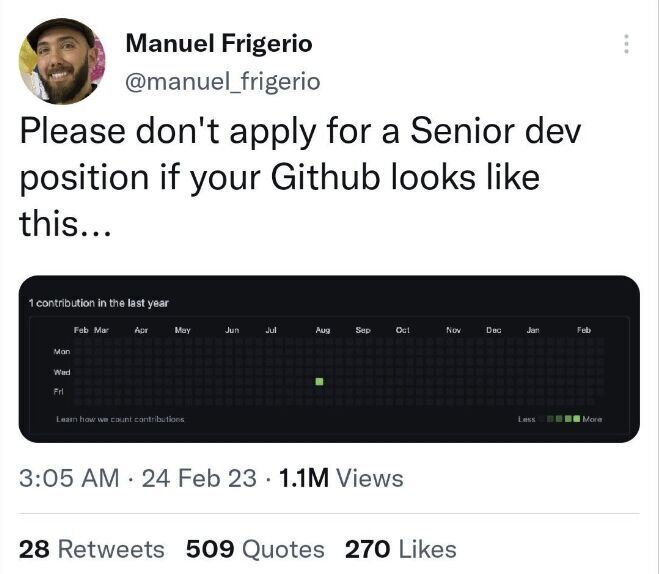How do we evaluate what we can either discover about a person and their portfolio - or with the lack of information - help them tell their story.
Just as well use this as an opportunity to help you think about telling your story in a way that could lead an evaluator to important insights.
Bad Examples
Let’s take the viral example of someone gatekeeping on a single area: GitHub activity:

Many have seen this take (and it may very well be fake) but is it such an easy example to pick on because it’s soo easy to invalidate. If you were to judge solely on public activity - you would be wrong for more than one reason.
My own Example
Take my own GitHub activity for example:

Patterns stand out - I would hope someone looking at this as a single data point could ask: Tell me about your GitHub activity. (I would love this question).
I’d answer:
- I have the privilege of working on public repositories
- I collaborate with OSS foundation projects x/y/z
At the same time i’d add:
- I’m in a season of my life where I guard my free time
- I don’t typically have the bandwidth to work on non-critical issues in my free time (see how weekends are empty typically)
- Vacations are a time to focus on my family and health (See multiple empty weeks in a row)
But let’s say I was interviewing someone who listed an GitHub profile that shows no activity - I would still ask them to talk about it.
Maybe even frame the problem so they see an optimistic intent to the question: “Tell me more about your GitHub activity - I can’t see any public activity - How have you been developing or contributing?”
It might be as simple as - “I use another platform” or “I host my own git server”.
Build the story together
GitHub is one example - help this person to tell their story. I’ve seen this happen many times - and it is a very simple and effective way to get to know someone.
Maybe you’re looking at certifications or other notable activity. Acknowledge the activity itself but also delve into the context. “Why did you pursue this?” or “What did you learn?” or even “Where do you want to head next?”.
Takeaways
There are a number of ways to discover meaningful information about someone - and most of the time it is about helping them advocate for themselves.
Some people may require work - but that is okay. We have the potential to lead a person to where they want to be if they are willing to put in the work.